I am trying to define a simple grammar for C which I am using in Lark. The problem is, I defined the closing parenthesis ("}" or ")") as a terminal in the grammar but it is throwing an error as "No terminal matches ')' in the current parser context". In many example grammar rules that I saw, the closing parenthesis was defined as terminals. How do I resolve this issue? Here is the code:
from lark import Lark
g=r'''start : header_files
preprocessor_commands : "#include" | definition
definition : def string (header_files)* program
def : "#define" | "#undef" | "#ifdef" | "#ifndef" | "#if" | "#else" | "#elif" | "#endif" | "#error" | "#pragma"
header_files : preprocessor_commands file_names (header_files)* program
file_names : "<stdio.h>" | "<math.h>" | "<conio.h>" | "<stdlib.h>" | "<string.h>" | "<ctype.h>" | "<time.h>" | "<float.h>" | "<limits.h>" | "<wctype.h>"
program : data_type func "(" var ")" "{" (codeblock) close_par | data_type func "()" "{" (codeblock) close_par
data_type : "void" | "int" | "float" | "double" | "long" | "char" | "string" | "long long" | "unsigned_int"
func : "main" | string
var : string
codeblock : "return" var term | "return" const term | "return" func term | "return" "(" expressions ")" term | declarations | expressions | statements | call | print
declarations : data_type var assign const ";" (declarations)* codeblock | data_type var assign var ";" (declarations)* codeblock | data_type var ("," var)* ";" (declarations)* codeblock
expressions : arithmetic | bitwise | assignment
arithmetic : add | sub | mul | div | mod | unary
add : const "+" (arithmetic)* | var "+" (arithmetic)*
sub : const "-" (arithmetic)* | var "-" (arithmetic)*
mul : const "*" (arithmetic)* | var "*" (arithmetic)*
div : const "/" (arithmetic)* | var "/" (arithmetic)*
mod : const "%" (arithmetic)* | var "%" (arithmetic)*
unary : inc | dec
inc : "++" var | var "++"
dec : "--" var | var "--"
bitwise : and | or | xor | boc | ls | rs
and : const "&" (bitwise)* | var "&" (bitwise)*
or : const "|" (bitwise)* | var "|" (bitwise)*
xor : const "^" (bitwise)* | var "^" (bitwise)*
boc : var assign "~" const | var assign "~" var
ls : const "<<" const | var "<<" const
rs : const ">>" const | var ">>" const
assignment : assign | "*=" | "/=" | "%=" | "+=" | "-=" | "<<=" | ">>=" | "&=" | "^=" | "|="
assign : "="
statements : if | switch | loop
if : ("if" "(" logical close_par codeblock)+ ("elseif" "(" logical close_par codeblock)* ["else" codeblock]
logical : land | lor | lnot | equ | gre | les | greq | leeq | neq
land : const "&&" (logical)* | var "&&" (logical)*
lor : const "||" (logical)* | var "||" (logical)*
lnot : "!" (logical)+ | "!" (arithmetic)+ | "!" var | "!" const
equ : const "==" (logical)* | var "==" (logical)*
gre : const ">" (logical)* | var ">" (logical)*
les : const "<" (logical)* | var "<" (logical)*
greq : const ">=" (logical)* | var ">=" (logical)*
leeq : const "<=" (logical)* | var "<=" (logical)*
neq : const "!=" (logical)* | var "!=" (logical)*
switch : "switch" ("(" expressions ")") "{" (switch_case)* ["default" ":" codeblock] close_par
switch_case : "case" const ":" codeblock (switch_case)*
loop : for | while | do_while
for : "for" "(" [[data_type] var assign const] ";" [logical] ";" [arithmetic] ")" "{" codeblock "}" | "for" "(" [[data_type] var assign const] ";" [logical] ";" [arithmetic] ")" codeblock
while : "while" "(" logical ")" "{" codeblock "}" | "while" "(" logical ")" codeblock
do_while : "do" "{" codeblock "}" "while" "(" logical ")"
call : func "(" var ("," var)* ")" term | var assign func "(" var ("," var)* ")" term | func "(" ")" term | var assign func "(" ")" term
print : "printf" "(" (dcstring)* ")" term
%import common.SIGNED_NUMBER
const : SIGNED_NUMBER
term : ";" codeblock
tpar : ")" | "}" | ")" codeblock
digit : "0".."9"
nz_dig : "1".."9"
integer : (digit)* (nz_dig)+ | "-" (digit)* (nz_dig)+
decimal : (digit)+ "." (digit)+ | "-" (digit)+ "." (digit)+
letter : "a".."z" | "A".."Z"
char : letter | SIGNED_NUMBER
string : /[a-zA-Z0-9_.-]{2,}/ | (char)*
dcstring : /"[^"]*"/
close_par : "}" | ")" | "]"
WHITESPACE: " " | "\t" | "\f" | "\n"
%ignore WHITESPACE+
COMMENT: "//" /[^\n]/* | "/*" /(\S|\s)*?/ "*/"
%ignore COMMENT
'''
parser=Lark(grammar=g,parser="earley")
code='''#include<stdio.h>
#define PI 3.14
void main()
{
int a,b; long c=1;
if(a==b || b==c)
return 2;
}
'''
print(parser.parse(code).pretty())
This is the error :
